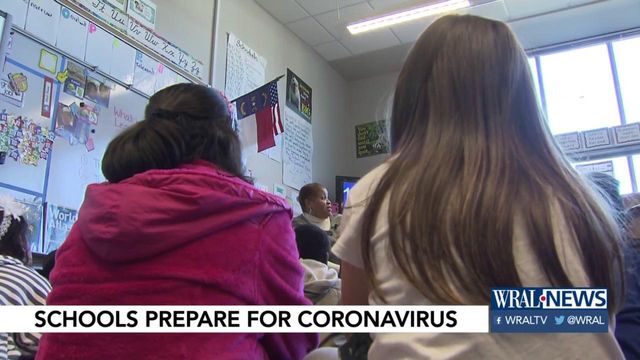NC gears up for coronavirus as infection continues global spread
North Carolina is taking federal health officials' warning about an impending coronavirus pandemic in the U.S. to heart.
The U.S. Centers for Disease Control and Prevention said Tuesday that the rapid spread of the virus, known as COVID-19, across the globe makes it a question of when, not if, it will become widespread in the U.S. The CDC urged cities, hospitals, businesses and schools to start making preparations.
State Health Director Dr. Elizabeth Tilson said North Carolina has been making such preparations for several weeks. A task force that includes public health and emergency management officials has been considering what policies and procedures to implement in a worst-case scenario and what supplies hospitals and other health care providers would need, Tilson said Wednesday.
Business owners should start reviewing their operational plans where large number of employees are out of work, including encouraging people to work for home and communicate over the phone or online, she said. Parents also should make contingency plans if they or their children need to stay home for an extended period, she said.
"This is just a really good time in North Carolina that, the risk is low, to start looking ahead and being prepared," Tilson said.
Officials at both Duke University Hospital in Durham and UNC Hospitals in Chapel Hill said their staffs have been ready for COVID-19 for weeks. Staff meet several times each week to discuss contingency plans, they said.
"The containment strategy for respiratory viruses [like COVID-19] is not that different from what we normally do" during flu season, said Dr. Thomas Owens, president of Duke Hospital and senior vice president of the Duke University Health System. "We don't have to change our practices. We don't have to change our environment nearly as much as we would for Ebola, for example."
Duke had a practice run, of sorts, last month, when a person who had been traveling in China returned to Raleigh-Durham International Airport with respiratory problems and was taken to the hospital. Test determined the person didn't have COVID-19.
"That caused us to put into place our full plan for how we would triage, diagnose and treat a potential patient with coronavirus. What we learned from that ws that our preparations were sound and effective. Our teams knew what to do," Owens said. "We also learned, of course, that, if we had more than one or two or a handful of patients, that we had more planning to do to manage what that would look like if we had tens or hundreds of patients. Right now, we don’t think that’s highly likely to happen, but our job is to be prepared for what our community might need."
State Health Director Dr. Elizabeth Tilson also noted that hospitals across North Carolina dealt with the global H1N1 flu pandemic a decade ago, so they already have the policies and procedures in place to handle another outbreak.
"We've gone through these infections before in our health care system, [they're] very good at preparing," Tilson said.
UNC Hospitals officials said staff have been asking patients with respiratory symptoms if they've traveled recently to China or another area where a COVID-19 outbreak has been reported.
"If you arrive to the emergency room, it’s one of the first questions we ask. If you arrive to urgent care, it’s one of the first questions we ask. If you call to schedule an appointment, it is the first question we ask," said Christian Lawson, director of emergency services.
"When patients come in, they are asked a series of questions which would help identify them, isolate them and give them specific personal protective equipment to take care of them," said Emily Sickbert-Bennett, director of infection prevention.
To contain the spread of the virus, the hospitals plan to use negative-pressure rooms, where air is pulled in from outside but isn't allowed to recirculate and spread the germs elsewhere.
Owens said hospital staff are drilled on wearing protective gear to reduce the risk that they become infected, as well as following best practices for hygiene.
"Since the majority of patients with coronavirus do not require hospitalization, they need good outpatient care and follow-up," he said.
Outbreak could highlight need for more broadband in NC
With COVID-19 patients likely being quarantined at home, high-speed internet will become a necessity for people to work and students to complete their schoolwork.
Parts of North Carolina are far less prepared to meet that challenge than others.
Many rural counties have patchy broadband access at best, and some residents and students have to rely on Wi-Fi at fast food restaurants for internet access. While people can use mobile phones for high-speed access, that requires a smartphone and a generous data package.
The gaps in access could also affect health care. CDC officials suggested that telehealth – online doctor visits – could help them diagnose COVID-19 cases quickly, but live video interviews also require high-speed internet.
"If public health measures are necessary, we know online access would be more important than ever," said Scott Mooneyham, spokesman for the North Carolina League of Municipalities, which has been pushing to expand broadband access statewide. "It really does highlight what we’ve been saying – this is not a luxury. Broadband access is critical infrastructure, and everyone needs access."












